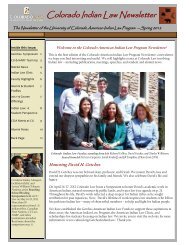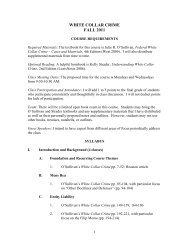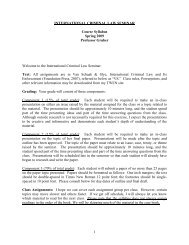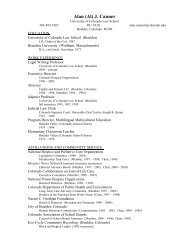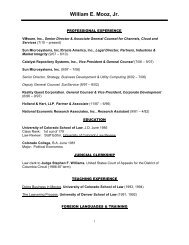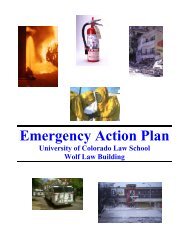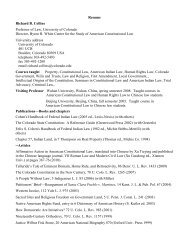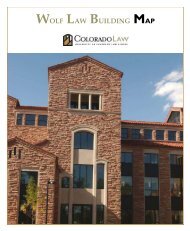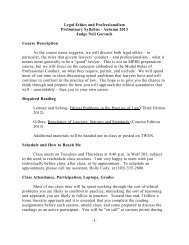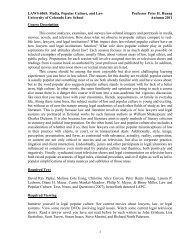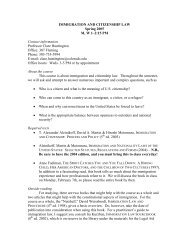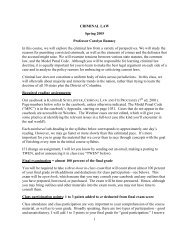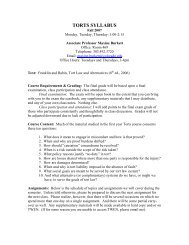Restitution In Criminal Cases - Colorado Law
Restitution In Criminal Cases - Colorado Law
Restitution In Criminal Cases - Colorado Law
Create successful ePaper yourself
Turn your PDF publications into a flip-book with our unique Google optimized e-Paper software.
Reproduced by permission. ©2001 <strong>Colorado</strong> Bar Association,30 The <strong>Colorado</strong> <strong>Law</strong>yer 125 (October 2001). All rights reserved.CRIMINAL LAW NEWSLETTER■by Robert J. Dieter<strong>Restitution</strong> in <strong>Criminal</strong> <strong>Cases</strong><strong>Colorado</strong> law requires a sentencingcourt to include considerationof restitution when imposinga sentence or approving a deferredjudgment and sentence. 1 Imposingrestitution on criminal defendants is supportedby theories of rehabilitation anddeterrence, 2 as well as an effort “to makethe victim whole” to the extent practicableand “to take the profit out of crime.” 3 The<strong>Colorado</strong> legislature first endorsed restitutionas an alternative or supplement totraditional criminal sanctions during the1970s. 4 Significant amendments to restitutionstatutes were made in 1996. 5 Now,the enactment of Title 16, Article 18.5 ofthe <strong>Colorado</strong> Revised Statutes (“CRS”),which is effective as to restitution ordersentered on or after September 1, 2000,makes restitution subject to a more consistentand comprehensive statutoryscheme that is (1) centralized in one CRSarticle, and (2) designed to implementmore effective and timely assessment andcollection of restitution on behalf of crimevictims. 6Toward those ends, the <strong>Colorado</strong> legislatureexpressed its intention that statutoryprovisions concerning restitutionshould be liberally construed in favor ofthe victims of crime and their immediatefamilies. 7 This article summarizes thatlegislation and highlights some of the issuesit raises for criminal practitioners.Column Ed.: Patrick Furman, Universityof <strong>Colorado</strong> School of <strong>Law</strong>,Boulder—(303) 492-8126<strong>Restitution</strong> to be Addressed<strong>In</strong> All <strong>Criminal</strong> <strong>Cases</strong>Unless the sentencing court makes aspecific finding that no victim of the offensesuffered a pecuniary loss, 8 the court is requiredto order a defendant to make restitutionin all cases involving a conviction ofa felony, misdemeanor, petty, or misdemeanortraffic offense where a “victim”sustains a pecuniary loss due to a defendant’scriminal conduct. 9 For purposes ofrestitution, the term “conviction” means averdict of guilty, a plea of guilty or nolo contendere,or receiving a deferred judgmentand sentence. 10 <strong>Restitution</strong> is required tobe part of any sentence to probation 11 orincarceration 12 and is made a condition ofparole. 13 Further, defendants who havecaused the same pecuniary loss are jointlyand severally liable for restitution payments.14<strong>In</strong> addition to Title 16, Article 18.5, otherstatutory provisions afford crime victimsthe right to restitution. 15 Also, certainoffenses, such as crimes committed againstat-risk adults and at-risk juveniles andsex offenses committed against children,specifically provide for payment of restitution.16 Moreover, crime victims may applyfor various victim assistance servicesthrough the Victims and Witness Assistanceand <strong>Law</strong> Enforcement Fund, 17 andvictims of certain types of offenses may beeligible to apply for compensation throughthe Crime Victim Compensation Fund foremergency needs and for certain out-ofpocketexpenses not covered by insurance.18The “Victim”<strong>In</strong> 1996, the <strong>Colorado</strong> legislature broadenedthe definition of the term “victim” sothat the term included, among others,“anyperson aggrieved by a defendant.” 19 Thischange encompassed not only the immediateand direct victim of the offense, butalso the victim’s immediate family members,such as a spouse or child. 20 Also addedto the definition was any victim compensationboard that had paid a victim compensationclaim, as well as any person orentity that suffered a loss because of acontractual obligation with the victim, suchas an insurer. 21 This 1996 definition furtherincluded a governmental entity thatmay qualify as a victim to whom restitutionis payable such as, for example, theDepartment of Social Services from whicha defendant fraudulently obtains foodstamps. 22Under the 2000 legislation, the term“victim” for restitution purposes incorporateselements of the existing law as wellas additional categories, and now includes:(1) persons against whom any felony, misdemeanor,petty, or traffic misdemeanoroffense has been attempted or committed;23 (2) persons who are harmed by criminalconduct in the course of a scheme, conspiracy,or pattern of criminal behavior; 24(3) persons suffering losses because of acontractual obligation with the victim oran insurer who reimburses the immediatevictim of the loss; 25 and (4) a victim compensationboard that has paid a victimcompensation claim. 26 The statute excludesany person accountable for the criminalconduct or episode as principal, complicitor,or conspirator. 27There is no requirement in the statutethat a person or entity be named as a victimin the charging documents to be eligibleto recover restitution, provided thatthe person or entity is immediately or directlyaggrieved by the defendant’s criminalact. For example, in one case, a defen-This newsletter is sponsored by the CBA<strong>Criminal</strong> <strong>Law</strong> Section. This month’s articlewas written by Robert J. Dieter,Boulder, Clinical Professor of <strong>Law</strong> at theUniversity of <strong>Colorado</strong> School of <strong>Law</strong>—(303) 492-8126. Prof. Dieter wishes to acknowledgethe research assistance ofPenelope R. Glover, a 2001 graduate ofthe School of <strong>Law</strong>.THE COLORADO LAWYER / OCTOBER 2001 / VOL. 30, NO. 10 / 125
128 CRIMINAL LAW NEWSLETTER Octobertered. 64 If the defendant cannot pay thefull amount of restitution at the time theorder is entered, a “collections investigator”is to establish a payment schedule tomonitor and collect the money owed. 65The collections investigator may modifythe payment schedule and institute collectionprocedures. 66 <strong>In</strong> felony cases inwhich the defendant is sentenced to prison,the <strong>Colorado</strong> Department of Correctionsperforms these functions. 67 For personssentenced to community corrections, thecommunity corrections program is authorizedto establish a restitution paymentschedule. 68If restitution is not paid at the time arestitution order is entered, the defendantis assessed an additional one-time fee of$25, payable after the defendant has satisfiedall orders for restitution. 69 <strong>In</strong> addition,a defendant may be assessed a $10late fee on each late payment. These feesmay be waived due to a defendant’s indigency.70<strong>In</strong>terest is owed at the rate of 12 percentper annum, 71 and courts are authorized torequire a defendant to provide security forthe payment of restitution, for example,requiring a defendant to execute a promissorynote and deed of trust. 72 However,to pay restitution, a state court may notrequire a defendant to assign or otherwisealienate Employee Retirement <strong>In</strong>comeSecurity Act 73 (“ERISA”) qualified pensionfunds. 74Prior to 2000, restitution ordered as acondition of probation was to be paid withintwelve months, regardless of the amountowed. 75 Under the new legislation, defendantsare to make restitution within a periodof time specified by the court. 76 Failureto pay restitution that is ordered as acondition of probation can result in thecourt modifying, extending, or revokingprobation, 77 including imposing work-releaseprogram sentences 78 or finding defendantsin contempt of court. 79 Before anypunitive actions can be taken, it must beshown that the defendants had the financialability to make the payments owedwhen they were due. 80 However, the merefact of non-payment constitutes prima facieevidence of a violation of an order topay restitution. <strong>In</strong> that situation, the burdenfalls on the defendants to prove by apreponderance of the evidence that theyare unable to make restitution paymentsas they became due. 81Revocation and punitive proceedingsmust be instituted before the term of probationhas expired. Otherwise, the trialcourt lacks jurisdiction to revoke probationfor failure to pay restitution. 82 For example,in People v. Gore 83 the <strong>Colorado</strong><strong>Restitution</strong> in JuvenileSupreme Court held that, absent a timelyrequest to extend probation, the trialcourt lacked jurisdiction to revoke probationwhere the defendant’s restitutioncheck was returned for insufficient fundsseven days after expiration of the probationaryperiod and where no revocationrequest was filed before the period of probationran.<strong>Restitution</strong> required as a condition ofparole must be paid within the period oftime that the defendant is on parole. If nottimely paid, the restitution may be subjectto collection processes and the board mayextend the period of parole (subject to statutorylimitations) or revoke the parole. 84The new legislation also clarifies the proceduresavailable to victims in enforcingthe order. <strong>Restitution</strong> orders are enforceablein the same manner as a final judgmentin a civil matter, including the recoveryof reasonable attorney fees and costs,among other ways. 85When a defendant fails to pay restitution,the court or a victim may commencecollection, including the use of lawyers andcollection agencies, with a fee cap of 25percent that is added to the amount of restitutiondue. 86 The court also may orderattachment of up to 50 percent of the defendant’s“earnings” to be applied to pastdue restitution. 87 Collection procedures includethe recording of a lien against thedefendant’s real or personal property, includingmotor vehicles. 88 During any periodof time that a defendant is incarceratedas a state prisoner, the superintendent ofthe facility may direct that a portion of thedefendant’s wages or compensation earnedin work programs be applied to any unpaidrestitution. 89Dischargeability inBankruptcy<strong>In</strong> Kelly v. Robinson, 90 the U.S. SupremeCourt held that restitution obligations imposedon criminal defendants as a conditionof probation in state criminal proceedingswere not subject to discharge in proceedingsunder Chapter 7 of the BankruptcyCode (“Code”). <strong>In</strong> 1990, Congress passedlegislation amending the Code, makingcriminal restitution obligations non-dischargeablein Chapter 13 proceedings aswell. 91 The <strong>Colorado</strong> legislation specificallyprovides that restitution obligations area debt for “willful and malicious” injury forpurposes of exceptions to discharge inbankruptcy as provided in 11 U.S.C. §523. 92ProceedingsThe juvenile code contains specific statutoryprovisions authorizing courts to imposerestitution obligations on juvenile offendersin juvenile proceedings. Prior toSeptember 1, 2000, these statutes exemptedjuveniles for whom restitution wouldcause serious hardship or injustice. EffectiveSeptember 1, 2000, as with adult offenders,juvenile offenders must pay restitutionin a reasonable manner regardlessof their circumstances. These restitutionorders are made subject to the collectionprovisions of CRS Title 16 Article 18.5. 93<strong>In</strong> addition, the cap on parental liabilitywas raised from $3,500 to $25,000 for damagescaused by a juvenile’s delinquentact. 94 However, this obligation may be absolvedon a court finding that the guardian,legal guardian, or parent “has madediligent, good faith efforts to prevent ordiscourage the juvenile from engaging indelinquent activity.” 95Constitutional IssuesImplementing the various legislativechanges raises several constitutional issues,including double jeopardy and ex postfacto application of the law. Ordinarily, oncea court imposes a legal sentence and thedefendant begins serving that sentence,the court cannot increase the amount ofrestitution ordered, except as may be providedby statute. Otherwise, an order increasingthe amount of restitution has theeffect of increasing the punishment originallyimposed. Thus, the order would violateconstitutional prohibitions againstdouble jeopardy. 96 Similarly, litigation hasfocused on when a court may order restitutionunder amendatory legislation thatbecomes effective after the date of the commissionof the defendant’s offense. <strong>In</strong> thiscontext, defendants have challenged restitutionorders alleging violation of the prohibitionon ex post facto application of thelaws.<strong>In</strong> People v. Woodward, 97 the <strong>Colorado</strong>Supreme Court held that ordering a defendantto pay restitution to a victim’s insurerdid not constitute an ex post facto violation,even though the insurance companywas not named within the class ofvictims eligible for restitution under thestatutory scheme in effect at the time thedefendant committed the crime.The Courtreasoned that because the defendant wasdirected to pay the same amount of restitutionas in the original order, the defendant’spunishment was not made more128 / THE COLORADO LAWYER / OCTOBER 2001 / VOL. 30, NO. 10
2001 CRIMINAL LAW NEWSLETTER 129burdensome simply by ordering paymentto the insurance company for the amountit had reimbursed to the victim for hisloss. The order did not increase the defendant’sobligation; it simply directed thatthe restitution originally ordered be paidto a different entity. Thus, in this instance,retroactive application of the amendedstatute, which enlarged the class of victimsto include insurance companies, did notaffect the amount of restitution due; itsimply redirected the payment obligation.ConclusionThe new legislation significantly tightensthe enforceability of restitution ordersin favor of the victims of crime and will addto the responsibilities of the courts, prosecutors,and defense counsel. The eliminationof a court’s ability to consider a defendant’sability to pay when establishing theamount of restitution will make restitutionobligations more onerous for indigentdefendants.The reach of restitution orders to encompassclaims of pecuniary loss by a victim’simmediate family members is problematic,as are the uncertainties of a defendant’srights to contest restitution, suchas the right to demand, for example, anindependent evaluation, medical or otherwise,of a victim’s claims or an insurancecompany’s payments. Finally, courts maybe faced with the prospect of determiningwhether a particular witness’s entitlementto restitution might open the doorfor an attack on that witness’s motive fortestifying. <strong>In</strong> sum, these legislative changeswill complicate defense counsel’s obligationto advise the client of the consequencesof entering into a disposition wheremonetary loss and expenses are incurredas a result of the defendant’s conduct orinvolvement in a crime.NOTES1. CRS §§ 16-18.5-101 (effective as to restitutionorders entered on or after Sept. 1, 2000)and 24-4.1-302.5(1)(h) (establishes crime victim’sright to restitution for actual pecuniarydamages). See also People v. Tipton, 973 P.2d713 (Colo.App. 1998), cert. denied, Docket No.99SC26 (April 12, 1999).2 CRS § 16-18.5-101(c-d). See <strong>Colorado</strong> LegislativeCouncil, Study of <strong>Criminal</strong> <strong>Restitution</strong>in <strong>Colorado</strong>: Report to the <strong>Colorado</strong> General Assembly,Research Pub. No. 467 (Nov. 1999).3. People v. Milne, 690 P.2d 829, 836 (Colo.1984). See also CRS § 24-4.1-201 (making anyprofits from a crime available as restitution).4. 1976 Colo. Sess. <strong>Law</strong>s. 551, codified atCRS §§ 27-28-101 to -102.5. CRS §§ 16-11-102(4), 16-11-204.5(1), and17-2-201(5)(c)(I) (effective as to restitution ordersentered on or after June 3, 1996).6. CRS §§ 16-18.5-101 et seq. (effective as torestitution orders entered on or after Sept. 1,2000). <strong>In</strong> addition, many existing statutory provisionswere amended as necessary and crossreferencedto the new CRS article.7. CRS § 16-18.5-101(2).8. CRS § 16-18.5-103(1)(d).9. CRS § 16-18.5-101. See also CRS §§ 16-11-102(4), 16-11-204.5(1), and 17-2-201(5)(c)(I).Additional statutory provisions include: CRS§§ 18-1-105(12) (felony sentence); 18-1-106(5)(misdemeanor sentence); 18-1-107(1) (petty offense);and 42-4-1701(3)(a)(II)(B) (traffic offense).10. CRS § 16-18.5-102(2).11. CRS §§ 16-11-204.5 and -204(1). See alsoPeople v. Maxich, 971 P.2d 268 (Colo.App. 1998)(discussing CRS § 16-11-204.5).12. CRS § 16-11-102(4). See also People v.Johnson, 780 P.2d 504 (Colo. 1989); People v.Apodaca, 998 P.2d 25 (Colo.App. 1999), cert. denied,Docket No. 99SC591 (April 24, 2000); Tipton,supra, note 1.13. CRS § 17-2-201(5)(c)(I). See also CRS §16-18.5-106(3).Do You EvaluateMedical Malpractice <strong>Cases</strong> for Clients?If Not . . .Your Client Can Callfor a free initial consultationGary S. Milzer, M.D.Medical DirectororJerry C. Katz, J.D.Katz <strong>Law</strong> FirmThe Medical Malpractice <strong>Law</strong> Firm<strong>In</strong> Denver:303-771-2288Toll Free:888-703-2288www.themedicalmalpracticelawfirm.comTHE COLORADO LAWYER / OCTOBER 2001 / VOL. 30, NO. 10 / 129
130 CRIMINAL LAW NEWSLETTER October14. CRS § 16-11-204.5(4) (effective June 3,1996).15. CRS § 24-4.1-302.5(1)(h) (establishescrime victim’s right to restitution for “actualpecuniary damages”).16. CRS §§ 18-6.5-106(3) and 18-3-414. Othersuch offenses include: CRS §§ 18-9-206(3)(unauthorized release of research or quarantinedanimals), 18-9-204.5(3)(e)(III) (ownershipof dangerous dog), 18-9-113(1)(c) (desecrationof venerated object), and 18-5-205(6) and 16-7-304 and -404 (fraud by check).17. CRS § 24-4.2-105.18. CRS §§ 24-4.1-108 and -109.19. CRS § 16-18.5-102(4)(a).20. CRS § 16-11-204.5(1) (term includes victim’sspouse and parent, siblings, or child whois living with the victim). See also People v.Estes, 923 P.2d 358 (Colo.App. 1996), cert. denied,Docket No. 96SC257 (Sept. 16, 1996).21. CRS §§ 16-11-102(4), 16-11-204.5(4), and17-2-201(5)(c)(I). See also People v. Rivera, 968P.2d 1061 (Colo.App. 1997).22. People v. Witt, 15 P.3d 1109 (Colo.App.2000), cert. denied, Docket No. 00SC567 (Dec.18, 2000).23. CRS § 16-18.5-102(4)(a)(I). This elementapparently does not encompass “traffic infractions”that are not criminal offenses.24. CRS § 16-18.5-102(4)(a)(II).25. CRS § 16-18.5-102(4)(a)(III). See also Rivera,supra, note 21.26. CRS § 16-18.5-102(4)(a)(IV).27. CRS § 16-18.5-102(4)(c).28. People v. Lunsford, 30 Colo.<strong>Law</strong>. 215 (May2001) (App.No. 99CA2274, annc’d 5/10/01).29. Id. (defendant ordered to pay restitutionfor noneconomic damages including pain andsuffering, future inconvenience, future impairment,and future wage loss). See also CRS § 16-18.5-102(4)(a)(III).30. Lunsford, supra, note 28.31. CRS §§ 10-4-701 et seq.32. People v. Rogers, 20 P.3d 1238 (Colo.App.2000), cert. denied, Docket No. 00SC956 (April9, 2001) (defendant ordered to pay restitutionto victim’s workers’ compensation insurer whohad paid victim’s medical expenses).33. CRS § 16-18.5-102(4)(a)(V).34. CRS § 16-18.5-109(1-2).35. CRS §§ 16-11-101.5(1), 16-11-102(4), 16-11-204.5(1), 16-11-204.5(5), and 17-2-201(5)(c)(I) (effective as to restitution orders enteredon or after June 3, 1996).36. CRS § 16-18.5-103(3)(b)(I).37. CRS § 16-18.5-103. See also People v. Duran,991 P.2d 313 (Colo.App. 1999), cert. denied,Docket No. 99SC668 (Dec. 20, 1999); Rivera,supra, note 21. Cf. People v. Stewart, 926 P.2d105 (Colo.App. 1996), cert. denied, Docket No.96SC265 (Oct. 21, 1996) (decided under priorversion of statute).38. CRS § 16-18.5-102(3)(a). See also Witt,supra, note 22 (defendant ordered to pay restitutionto the Department of Social Services ofcost of investigating defendant’s fraudulentlyobtaining food stamps); People v. Dillingham,881 P.2d 440 (Colo.App. 1994), cert. denied,Docket No. 94SC404 (Oct. 11, 1994) (rewardmoney for information leading to the recoveryof stolen property included in restitution).39. CRS § 16-18.5-102(3)(b). See People v.Phillips, 732 P.2d 1226 (Colo.App. 1986) (investigationcosts, including attorney fees, can beordered paid to an insurer).40. Stewart, supra, note 37.41. Estes, supra, note 20.42. People v. Wright, 18 P.3d 816 (Colo.App.2000), cert. denied, Docket No. 00SC806 (Feb.20, 2001).43. People v. Duvall, 908 P.2d 1178 (Colo.App.1995).44. People v. Borquez, 814 P.2d 382 (Colo.1991) (where plea agreement based on seriesof thefts, trial court did not err in ordering defendantto pay restitution for actual, pecuniarydamages to victim sustained as result of other,uncharged offenses). Cf. People v. Quinonez, 735P.2d 159 (Colo. 1987) (restitution cannot be orderedpaid to person whose injuries were notalleged in the charging document to have resultedfrom defendant’s charged conduct).45. People v. Davalos, 30 Colo.<strong>Law</strong>. 209 (May2001) (App.No. 98CA2352, annc’d 5/10/01) (trialcourt erred in ordering restitution for thosethefts against victim committed outside thestatute of limitations period).46. People v. Valenzuela, 874 P.2d 420 (Colo.App. 1993), aff’d in part, rev’d in part, 893 P.2d97 (Colo. 1995). Cf. People v. Hoisington, 902P.2d 887 (Colo.App. 1995), cert. denied, DocketNo. 95SC293 (Sept. 5, 1995) (trial court deductedsetoff for unpaid wages owing defendant).47. See also People v. Brigner, 978 P.2d 163(Colo.App. 1999) (amount of restitution owedby defendant who defrauded victim by sellingcollateral without victim’s permission was fairmarket value of property at time defendantsold it and not victim’s alleged actual net loss).48. Johnson, supra, note 12.49. Duran, supra, note 37.50. Id.51. Maxich, supra, note 11 (release from civilliability does not limit a criminal court’s authorityto order restitution equivalent to actualpecuniary damages).52. Stewart, supra, note 37.53. CRS § 16-18.5-103(6).54. Brigner, supra, note 47. See also Estes, supra,note 20 (court improperly ordered restitutionfor cost of automobile loan that was notthe result of defendant’s criminal conduct, butwas simply an unrelated debt defendant owedvictim).55. Johnson, supra, note 12; Maxich, supra,note 11 (release from civil liability does not limita criminal court’s authority to order restitutionequivalent to actual pecuniary damages).56. CRS § 16-18.5-103(3)(b)(II).57. CRS § 16-18.5-103(1)(b).58. CRS § 16-18.5-103(1)(c).59. CRS § 16-18.5-103(3)(a).60. CRS § 16-18.5-103(2).61. People v. Valdez, 928 P.2d 1387 (Colo.App.1996). See also People v. McGraw, Docket No.99CA1704 (June 7, 2001) (where trial court didnot specify a time within which defendant wasrequired to respond to the prosecution’s statementof restitution, defendant’s request forhearing filed ten days after prosecution’s statementwas not untimely and entitled defendantto a hearing to contest restitution recommendedby prosecution).62. People v. Miller, 830 P.2d 1092 (Colo.App.1991), cert. denied, Docket No. 92SC51 (May26, 1992).63. People v. Stephenson, 12 P.3d 266 (Colo.App. 1999). See also Stewart, supra, note 37 (byaccepting court’s offer of probation rather thanincarceration, defendant does not waive rightto object to terms of restitution).64. CRS § 16-18.5-104(1).65. CRS §§ 16-18.5-102(1) and -104.66. CRS §§ 16-18.5-104 and -105.67. CRS § 16-18.5-106.68. CRS §§ 17-27-104(10) and 17-28-102.69. CRS § 16-18.5-104(2).70. CRS § 16-11-101.6(1).71. CRS § 16-18.5-103(4)(b)(I).72. People v. Neptune, 866 P.2d 176 (Colo.App. 1993).73. 29 U.S.C. §§ 1056(d)(1) and 1144(a).74. Stephenson, supra, note 63.75. CRS § 16-11-204.5(1).76. Pub.L.No. 200, p. 1046, § 9, effective Sept.1, 2000, codified at CRS § 16-11-204.5(1).77. CRS § 16-18.5-105(3)(I) and (III).78. CRS § 16-18.5-105(3)(d)(II).79. CRS § 16-18.5-105(3)(d)(IV).80. CRS § 16-18.5-105(3)(b). See also Stricklandv. People, 594 P.2d 578 (Colo. 1979). Cf. Peoplev. Afentul, 773 P.2d 1081 (Colo. 1989) (defendantentitled to establish financial inabilityto pay restitution as defense to charge of violatingrestitution requirement of deferred sentence).81. CRS § 16-11-206(3).82. People v. Gore, 774 P.2d 877 (Colo. 1989).83. Id.84. CRS § 17-2-201(5)(c)(I) and (II). <strong>Colorado</strong>is a member of an interstate compact authorizingcollection of restitution for <strong>Colorado</strong> offendersparoled to another state. CRS § 24-60-2802,Article VII (d)(vi).85. CRS §§ 16-18.5-104 and -107.86. CRS §§ 16-11-101.6(3), -204.5(1), and 17-2-201(5)(c)(I).87. CRS § 16-18.5-105(3)(b).88. CRS § 16-18.5-104(5).89. CRS § 16-11-101.6(5).90 Kelly v. Robinson, 479 U.S. 36 (1986).91.<strong>Criminal</strong> Victims Protection Act of 1990,Pub.L.No. 101-581, 204 Stat. 2865 (amending11 U.S.C. § 1328(a)(3)).92. CRS § 16-18.5-103(4)(d).93. CRS § 19-2-918.94. CRS § 19-2-919(2).95. CRS § 19-2-919(2)(a).96. People v.Wright, supra, note 42 at 1090.See also People v. Shepard, 989 P.2d 183 (Colo.App. 1999), cert. denied, Docket No. 99SC393(Nov. 8, 1999); Stewart, supra, note 37.97. 11 P.3d 1090 (Colo. 2000). ■130 / THE COLORADO LAWYER / OCTOBER 2001 / VOL. 30, NO. 10



